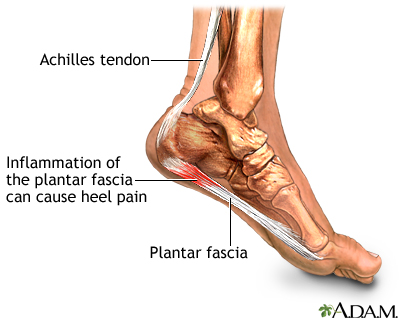Plantar Fasciitis

What is Plantar Fasciitis?
Plantar fasciitis is a common cause of heel pain, resulting from inflammation of the plantar fascia, a thick band of tissue that connects the heel bone to the toes. This condition can make standing or walking uncomfortable or even painful.
Who's at risk for Plantar Fasciitis?
Plantar fasciitis can affect anyone but is more common in people aged 40-60. Risk factors include being overweight, having a job that requires long periods of standing or walking, participating in high-impact activities, and having tight calf muscles or flat feet.
What causes Plantar Fasciitis?
The exact cause of plantar fasciitis is not well understood, but it is thought to involve repeated strain or injury to the plantar fascia. This can result in small tears and inflammation, leading to pain and discomfort.
How does Plantar Fasciitis start?
Plantar fasciitis typically begins with mild pain in the heel or arch of the foot, often noticeable after waking up in the morning or after periods of inactivity. The pain may decrease with movement but can worsen after prolonged standing or walking.
What are the symptoms of Plantar Fasciitis?
The primary symptom of plantar fasciitis is a stabbing pain in the heel or arch of the foot. The pain is usually worse in the morning or after long periods of rest, and it may also increase after prolonged standing or walking.
How is Plantar Fasciitis diagnosed?
A healthcare provider can usually diagnose plantar fasciitis based on the patient's symptoms, medical history, and a physical examination. Imaging tests like X-rays or MRIs may be used in some cases to rule out other potential causes of heel pain.
How can Plantar Fasciitis be treated?
Treatment for plantar fasciitis may include rest, ice, over-the-counter pain relievers, stretching exercises, and supportive footwear or orthotics. If conservative treatments don't provide relief, a healthcare provider may recommend physical therapy, night splints, or corticosteroid injections. In rare cases, surgery may be necessary.
What complications may occur with Plantar Fasciitis?
Chronic heel pain from plantar fasciitis can affect a person's daily activities and, in some cases, lead to problems with the knees, hips, or back due to changes in gait or posture.
How can I prevent Plantar Fasciitis?
Preventing plantar fasciitis involves maintaining a healthy weight, wearing supportive shoes, avoiding high-impact activities, and regularly stretching the calf muscles and feet.
Long-term management of Plantar Fasciitis
Managing plantar fasciitis long-term involves maintaining a healthy lifestyle, continuing with stretching exercises, and using appropriate footwear or orthotics to support the foot.
What is recent research saying about Plantar Fasciitis?
Recent research has focused on understanding the underlying causes of plantar fasciitis, as well as exploring new treatment options, such as extracorporeal shock wave therapy (ESWT) and platelet-rich plasma (PRP) injections.
Where can I go for more information on Plantar Fasciitis?
For more information on plantar fasciitis, consult your healthcare provider or visit reputable websites like the American Academy of Physical Medicine and Rehabilitation or the American Academy of Podiatric Sports Medicine.

